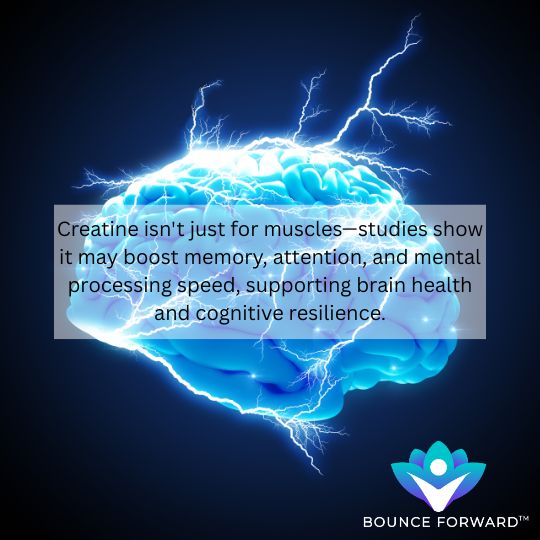From Comrades to Cognitive Health

Join me in a 'reconsidering mode'.I used to use creatine monohydrate when I was training for ultra-distance races like the Comrades Marathon - given that it's a 'go-to supplement' for muscle recovery and endurance. But I haven’t used it in years...these days, my runs are a more manageable 10–15 km at a time.
So, when I saw the latest research on creatine’s impact beyond the muscles, especially for brain health, my curiosity was sparked all over again.
Creatine: Not Just for Muscles Anymore
Recent studies show that creatine monohydrate supplementation may boost cognitive function in adults, particularly in memory, attention, and information processing speed.
This is exciting news !
Ways to stay mentally sharp are always on my radar.
Where Do We Get Creatine?
Here’s something fascinating: our bodies make a little creatine naturally, but most of it comes from our food-mainly red meat and seafood.
For example, 1 kg of raw beef contains about 2–4 grams of creatine, while 1 kg of herring can have up to 8 grams. Plant-based foods, on the other hand, contain virtually none. That means if you’re not eating much red meat or fish, your creatine intake might be lower than optimal-especially if you’re aiming for the 3–5 grams per day often recommended for peak performance and health.
Should We Supplement?
For years, I used creatine monohydrate-the most researched and effective form-during my intense training blocks. Now, with emerging evidence around cognitive benefits, I’m genuinely considering bringing it back into my routine, even as a “retired” ultra-runner.
The science suggests that it could help keep my brain as fit as my body, especially as I focus on resilience in every sense.
But What About Side Effects (Like Constipation)?
This question comes up a lot: does creatine cause constipation? The evidence says that when taken at recommended doses (typically 3–5 grams per day), creatine is unlikely to cause constipation for most people. Any digestive discomfort is usually due to dehydration-since creatine pulls water into your muscles, it’s essential to drink plenty of fluids.
If you do experience stomach issues, staying hydrated and choosing pure creatine monohydrate (without fillers) can make a big difference.
My Takeaway for You
I love seeing how the basics-like a simple supplement-can have ripple effects on our physical and mental wellbeing. Whether you’re running marathons or running meetings, the science is clear: creatine isn’t just for athletes anymore.
So, maybe it’s time we all think about what helps us stay strong, sharp, and adaptable-inside and out.
References: Wall Street Journal (May 13, 2025): “Creatine Is All the Rage. Should You Take It?”; PubMed, Medical News Today, Fitbod, Verywell Health, and recent cognitive health research.

.png)

.jpg)


.svg)
.svg)